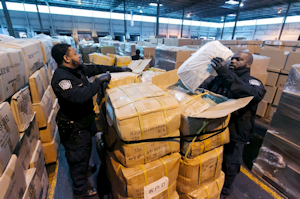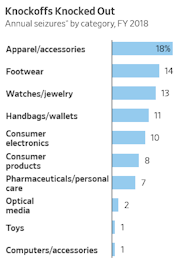Trump's
Declaring War on the Counterfeit Black Market
WSJ: U.S. Signals Crackdown on Counterfeit Goods Sold Online
1st
Time We've Seen Presidential Engagement in the Counterfeit Black Market
Trump administration targets e-commerce operators with broader enforcement
in effort to compel companies help root out fakes

The Trump administration is moving to curb the sale of imported counterfeit
goods over the internet,
warning electronic commerce platforms and warehouse operators of greater
scrutiny and penalties if they don’t help ferret out fakes.
The Department of Homeland Security is set to release a report Friday outlining
its immediate actions and longer-term goals for enlisting e-commerce players to
combat counterfeit products that officials say undermine U.S. technology and
manufacturing, harm bricks-and-mortar retailers and endanger consumers.
The new initiative, led by U.S. Customs and Border Protection and the White
House, comes the same month as an initial trade agreement with
 China
that
requires Beijing to take steps against counterfeiters or risk enforcement
actions that could trigger new tariffs.
China
that
requires Beijing to take steps against counterfeiters or risk enforcement
actions that could trigger new tariffs.
The Trump administration is seeking to pressure e-commerce giants including
Amazon.com Inc., which increasingly hosts lucrative third-party sales on its
platform, as well as financial firms, logistics services and other companies
that are positioned to help stem the rising tide of counterfeits and pirated
goods.
The DHS report, which was reviewed by The Wall Street Journal, says
law enforcement will begin identifying cases immediately
and “seek all available statutory authorities to pursue civil fines and other
penalties against these entities.”
It also calls for
new laws “to explicitly permit the government to seek injunctive relief against
third-party marketplaces and other intermediaries dealing in counterfeit
merchandise.”

“This is not about any one e-commerce platform—this is about e-commerce playing
by a different set of rules that simultaneously hammer brick-and-mortar
retailers, defraud consumers, punish workers and rip off intellectual-property
rights holders,” said White House trade adviser Peter Navarro, who is helping
lead the initiative.
As part of the enforcement effort, the report says customs agents will treat
domestic U.S. warehouses and fulfillment centers, such as those operated by
Amazon and others, as the “ultimate consignee” for goods that haven’t been sold
to consumers, giving officials power to scrutinize shipments even after they
have cleared the border and moved to a regional warehouse.
U.S. officials will share information with such warehouses about counterfeit
goods and “request they pursue abandonment and destruction with the rights
holders of any identical offending goods in their possession,” according to the
report.
Article originally published on
wsj.com